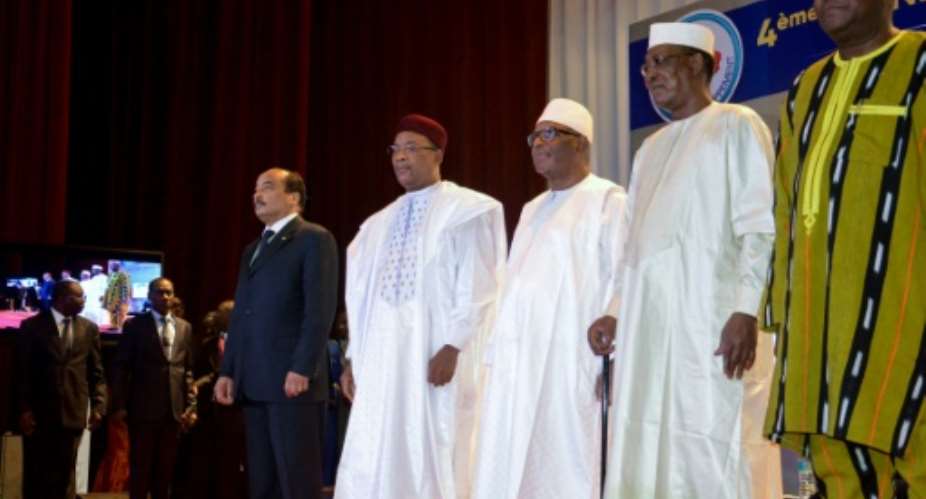A military school gathering five countries in the Sahel inducted its first officers on Monday into a programme to train future leaders of a joint anti-terror force.
Thirty-five senior officers were inducted into the G5 Sahel Defence Academy, located in the Mauritanian capital Nouakchott, for an eight-month course, an AFP reporter saw.
"They will be trained in techniques of high command and warfare, preparing them to be promoted" to general, a Mauritanian military official told AFP.
The G5 Sahel is an initiative conceived in 2015 to roll back jihadism and lawlessness in five states on the Sahara's southern rim.
Bringing together Burkina Faso, Chad, Mali, Mauritania and Niger, it aims to create a 5,000-man joint force to restore authority in areas grappling with jihadi raiders and brutal gangs.
But the scheme, which brings together five of the world's poorest and most fragile countries, has run into problems of financing, poor equipment and lack of training.
Since late last year, the French-backed force has carried out only six operations, with three more in the works.
It also has yet to win over civilians who fear retribution from the rebels if they provide support.
On June 29, the G5's then headquarters, in the central Malian town of Sevare, came under suicide attack, causing three deaths, two of them Malian soldiers.
Its commanding officer, Malian General Didier Dacko, was replaced by a Mauritanian, Hanena Ould Sidi, who in September ordered the HQ be moved to Bamako, Mali's capital.
About 420 million euros ($488 million) pledged at an international donors' conference in Brussels on February 23 has also been slow to materialise.





 Akufo-Addo commissions Phase II of Kaleo solar power plant
Akufo-Addo commissions Phase II of Kaleo solar power plant
 NDC panics over Bawumia’s visit to Pope Francis
NDC panics over Bawumia’s visit to Pope Francis
 EC blasts Mahama over “false” claims on recruitment of Returning Officers
EC blasts Mahama over “false” claims on recruitment of Returning Officers
 Lands Minister gives ultimatum to Future Global Resources to revamp Prestea/Bogo...
Lands Minister gives ultimatum to Future Global Resources to revamp Prestea/Bogo...
 Wa Naa appeals to Akufo-Addo to audit state lands in Wa
Wa Naa appeals to Akufo-Addo to audit state lands in Wa
 Prof Opoku-Agyemang misunderstood Bawumia’s ‘driver mate’ analogy – Miracles Abo...
Prof Opoku-Agyemang misunderstood Bawumia’s ‘driver mate’ analogy – Miracles Abo...
 EU confident Ghana will not sign Anti-LGBTQI Bill
EU confident Ghana will not sign Anti-LGBTQI Bill
 Suspend implementation of Planting for Food and Jobs for 2024 - Stakeholders
Suspend implementation of Planting for Food and Jobs for 2024 - Stakeholders
 Tema West Municipal Assembly gets Ghana's First Female Aircraft Marshaller as ne...
Tema West Municipal Assembly gets Ghana's First Female Aircraft Marshaller as ne...
 Dumsor is affecting us double, release timetable – Disability Federation to ECG
Dumsor is affecting us double, release timetable – Disability Federation to ECG
